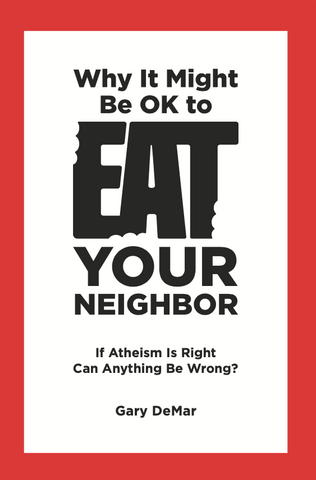What Atheists Think About We Humans
Please help us reach $10K in donations for a matching grant
For the scientist who has lived by his faith in the power of reason, the story ends like a bad dream. He has scaled the mountains of ignorance; he is about to conquer the highest peak; as he pulls himself over the final rock, he is greeted by a band of theologians who have been sitting there for centuries.[1]
Atheists have a problem. They can’t account for the outrage that evil is. Given their “matter-in-motion” operating system, outrage over evil is indefensible. Dr. Greg Bahnsen made the point in his debate with Edward Tabash at the University of California (Davis) in 1993, which is an excellent follow-up to the Bahnsen-Stein debate.

This book presents the full debate with included commentary, offering the reader a front-row seat to one of the most compelling philosophical showdowns in Christian history. It showcases not only the transcript of the debate but added explanations and insights throughout for an in-depth understanding of the presuppositional apologetic enterprise. The Great Debate: Does God Exist? will offer powerful and impactful explorations of faith, reason, and the foundations of your worldview in every area.
Tabash stated the following:
Now, Dr. Bahnsen says that without God, I have no basis for the moral complaint against Hitler. I submit that with God I have an even greater moral basis because there is an even larger problem, and that is how can an omniscient and omnipotent being that is supposed to be full of mercy and justice sit by while innocent people, to the millions, are tortured and gassed to death by Nazi Germany.
Later in the debate, Dr. Bahnsen responded:
You have to understand that if the God of the Bible does not exist, you have lost all principled moral complaint about what Hitler did to your relatives. In a godless universe, what one animal does to another animal is ethically irrelevant. You see, there is no rational basis for moral indignation or outrage in a godless universe. There is no moral obligation. What happens in a world where it’s matter in motion just happens. Period. See, we’re left, on the atheist conception, we’re left with Mr. Tabash’s feelings and desires. We’re left with his feelings, versus the feelings and desires of, say, a Hitler. And neither one of them in a godless universe has any more right than the other. … Hitler had the might to kill your relatives, and you have no complaint with that. Of course, you really do have a complaint, but you refuse to see the foundation of that. I have a complaint, and you should join me in making that complaint based on the character of God.
Accounting for morality in an atheist’s worldview is its Achilles’ heel along with reasoning, love, mercy, and compassion if humans are only highly evolved animals, as Peter Singer argues. Singer is a “moral philosopher” who is Emeritus Professor of Bioethics at Princeton University. Princeton was established as a Christian college. How far it has fallen. Here’s some of what Singer espouses. “In a 2004 interview, Singer claimed that there is nothing special about humans, and then stated, ‘All we are doing is catching up with Darwin. He showed us in the nineteenth century that we are simply animals. Humans have imagined we were a separate part of Creation, that there was some magical line between Us and Them. Darwin’s theory undermined the foundations of that entire Western way of thinking about the place of our species in the university.’”[2] Singer’s not the only person to mandate Darwinism in everything. I make this case in my book Why It Might Be OK to Eat Your Neighbor: If Atheism is Right, Can Anything Be Wrong?

Love your neighbor, or Eat your neighbor? The most damning assessment of a matter-only cosmos devoid of a Creator is that we got to this place in our evolutionary history by acts of violence whereby the strong conquered the weak with no one to support or condemn them. Why It Might Be OK to Eat Your Neighbor repeatedly raises the issue of accounting for the conscience, good and evil, and loving our neighbor. It’s shocking to read what atheists say about a cosmos devoid of meaning and morality.
Some people understood the dilemma of how to account for moral absolutes in a society that officially discounts God. Yale law professor Arthur Leff was perplexed that an agnostic culture even wants enduring values. In a lecture delivered at Duke University in 1979, Leff expressed his bewilderment:
I want to believe—and so do you—in a complete, transcendent and immanent set of propositions about right and wrong, findable rules that authoritatively and unambiguously direct us how to live righteously. I also want to believe—and so do you—in no such thing, but rather that we are wholly free, not only to choose for ourselves what we ought to do, but to decide for ourselves, individual and as a species, what we ought to be. What we want, Heaven help us, is simultaneously to be perfectly ruled and perfectly free, that is, at the same time to discover the right and the good and to create it.[3]
How can a solution ever be found in a random, impersonal cosmos, “governed” (if the word can be used) by chance given Leff’s logic? “[W]ith God out of the picture,” Philip Johnson writes, “every human being becomes a ‘godlet’—with as much authority to set standards as any other godlet or combination of godlets.”[4] Any person who utters a moral injunction is most often met with, “Who says? Who are you to impose your morality on me?”
While Leff did a masterful job in pointing out the problem, and he evaluated numerous theories in finding a way out of the dilemma created by his “own kind,” he offered no solution: “All I can say is this. It looks as if we are all we have. Given what we know about ourselves and each other, this is an extraordinarily unappetizing prospect; looking around the world, it appears that if all men are brothers, the ruling model is Cain and Abel. Neither reason nor love, nor even terror, seems to have worked to make us ‘good,’ and worse than that, there is no reason why anything should…. As things now stand, everything is up for grabs” (1249).
“Nevertheless,” as Leff continues, he cannot distance himself from a series of moral absolutes that he cannot account for in a matter-only world:
Napalming babies is bad.
Starving the poor is wicked.
Buying and sell each other is depraved.
Those who stood up to and died resisting Hitler, Stalin, [Idi] Amin, and Pol Pot—and General Custer too—have earned salvation.
Those who acquiesced deserve to be damned. There is in the world such a thing as evil.
[All together now.] Sez who?
God help us.
Exactly!
[1] Robert Jastrow, God and the Astronomers (New York: W.W. Norton and Co., 1978), 116.
[2] Richard Weikart, The Death of Humanity and the Case for Life (Washington, DC: Regnery Faith, 2016), 57.
[3] Arthur Leff, “Unspeakable Ethics, Unnatural Law,” Duke Law Journal (1979), 1229-1249. Phillip E. Johnson, “The Modernist Impasse in Law,” God and Culture: Essays in Honor of Carl F. H. Henry, D.A. Carson and John D. Woodbridge, eds. (Grand Rapids, MI: Eerdmans, 1993), 182.
[4] Johnson, “The Modernist Impasse in Law,” 182.
American Vision’s mission is to Restore America to its Biblical Foundation—from Genesis to Revelation. American Vision (AV) has been at the heart of worldview study since 1978, providing resources to exhort Christian families and individuals to live by a Biblically based worldview. Visit www.AmericanVision.org for more information, content and resources
Source: https://americanvision.org/posts/what-atheists-think-about-we-humans/
Anyone can join.
Anyone can contribute.
Anyone can become informed about their world.
"United We Stand" Click Here To Create Your Personal Citizen Journalist Account Today, Be Sure To Invite Your Friends.
Before It’s News® is a community of individuals who report on what’s going on around them, from all around the world. Anyone can join. Anyone can contribute. Anyone can become informed about their world. "United We Stand" Click Here To Create Your Personal Citizen Journalist Account Today, Be Sure To Invite Your Friends.
LION'S MANE PRODUCT
Try Our Lion’s Mane WHOLE MIND Nootropic Blend 60 Capsules
Mushrooms are having a moment. One fabulous fungus in particular, lion’s mane, may help improve memory, depression and anxiety symptoms. They are also an excellent source of nutrients that show promise as a therapy for dementia, and other neurodegenerative diseases. If you’re living with anxiety or depression, you may be curious about all the therapy options out there — including the natural ones.Our Lion’s Mane WHOLE MIND Nootropic Blend has been formulated to utilize the potency of Lion’s mane but also include the benefits of four other Highly Beneficial Mushrooms. Synergistically, they work together to Build your health through improving cognitive function and immunity regardless of your age. Our Nootropic not only improves your Cognitive Function and Activates your Immune System, but it benefits growth of Essential Gut Flora, further enhancing your Vitality.
Our Formula includes: Lion’s Mane Mushrooms which Increase Brain Power through nerve growth, lessen anxiety, reduce depression, and improve concentration. Its an excellent adaptogen, promotes sleep and improves immunity. Shiitake Mushrooms which Fight cancer cells and infectious disease, boost the immune system, promotes brain function, and serves as a source of B vitamins. Maitake Mushrooms which regulate blood sugar levels of diabetics, reduce hypertension and boosts the immune system. Reishi Mushrooms which Fight inflammation, liver disease, fatigue, tumor growth and cancer. They Improve skin disorders and soothes digestive problems, stomach ulcers and leaky gut syndrome. Chaga Mushrooms which have anti-aging effects, boost immune function, improve stamina and athletic performance, even act as a natural aphrodisiac, fighting diabetes and improving liver function. Try Our Lion’s Mane WHOLE MIND Nootropic Blend 60 Capsules Today. Be 100% Satisfied or Receive a Full Money Back Guarantee. Order Yours Today by Following This Link.






